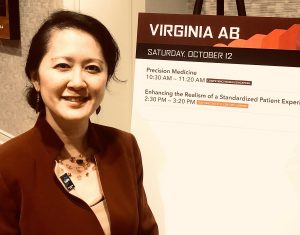
PA Nguyen Park is a passionate advocate for PAs to become involved in genomic medicine. Park, the founder and president of the Society of PAs in Genetics and Genomics and AAPA’s representative to the NIH/NHGRI’s Inter-Society Coordinating Committee for Practitioner Education in Genomics, recognizes the value of this growing field of medicine. “By working in genetics, PAs can make a huge difference for their patients by providing the high-quality care we’re known for and by increasing access to care,” says Park, who graduated from the PA program at Wayne State University in Detroit, Michigan, in 2003.
Park became involved with genetics in 2011, the year she left her long-held cardiology position in Michigan to work for the U.S. Department of Veterans Affairs in Albuquerque, New Mexico. That year, Park attended a session about genetics and genomics competencies for PAs at the Physician Assistant Education Association conference. Having an interest in genetics, she asked the workshop leaders how she could help and ended up joining the editorial board of the NIH/NHGRI Genetics and Genomics Competency Center. In this role, Park has written articles about genetics for publications like the Journal of the American Academy of PAs. She also collaborated with the original authors to rewrite the Physician Assistant Genomic Competencies to make them more applicable to every PA in all branches of medicine. The competencies were published in the Journal of Physician Assistant Education in 2016.
Park says there are several ways PAs can apply genetics in their profession. First, they can work in the field, where a shortage of medical geneticists has left a gap that needs to be filled. In one instance, a medical genetics office was able to reduce patient wait times from 12 months to three months by hiring a PA to work with the physician.
PAs can also consider genetics when treating patients, which Park, who now works in nephrology at the National Institutes of Health (NIH), has done throughout her career. To explain how this works, she uses the example of pharmacogenomics. In cardiology, where Park worked for eight years, providers usually prescribe clopidogrel, an anti-platelet agent, after a cardiac stent placement because it helps prevent clot formation in the stent. But not all patients metabolize clopidogrel in the same way, which could cause in-stent thrombosis, leading to serious consequences. Through awareness of pharmacogenomics, PAs and other providers can consider testing to see if a patient is able to metabolize various medications prior to prescribing, and order a different medication if they cannot. This is essentially precision medicine—taking into account differences in patients’ genes, as well as lifestyle and environmental factors, to make more tailored treatment and prevention recommendations.
“It’s a more proactive way to look at treatment,” Park says. “If every PA factored genetic influences into how we diagnose and treat patients, we could change thousands of lives.”
PAs can also get involved in the NIH All of Us Research Program by encouraging their patients to participate. The goal of All of Us is to build the largest database of health data from diverse participants that can be used for medical research. Medical research has historically excluded marginalized communities, but by participating in All of Us, patients can ensure they are represented in the data. “I really encourage patients to look at it and get involved,” Park says. Once the project is complete, PA researchers can use the data to make decisions about treatment and prevention for their patients. More information about this important program can be found here.

